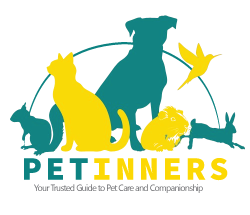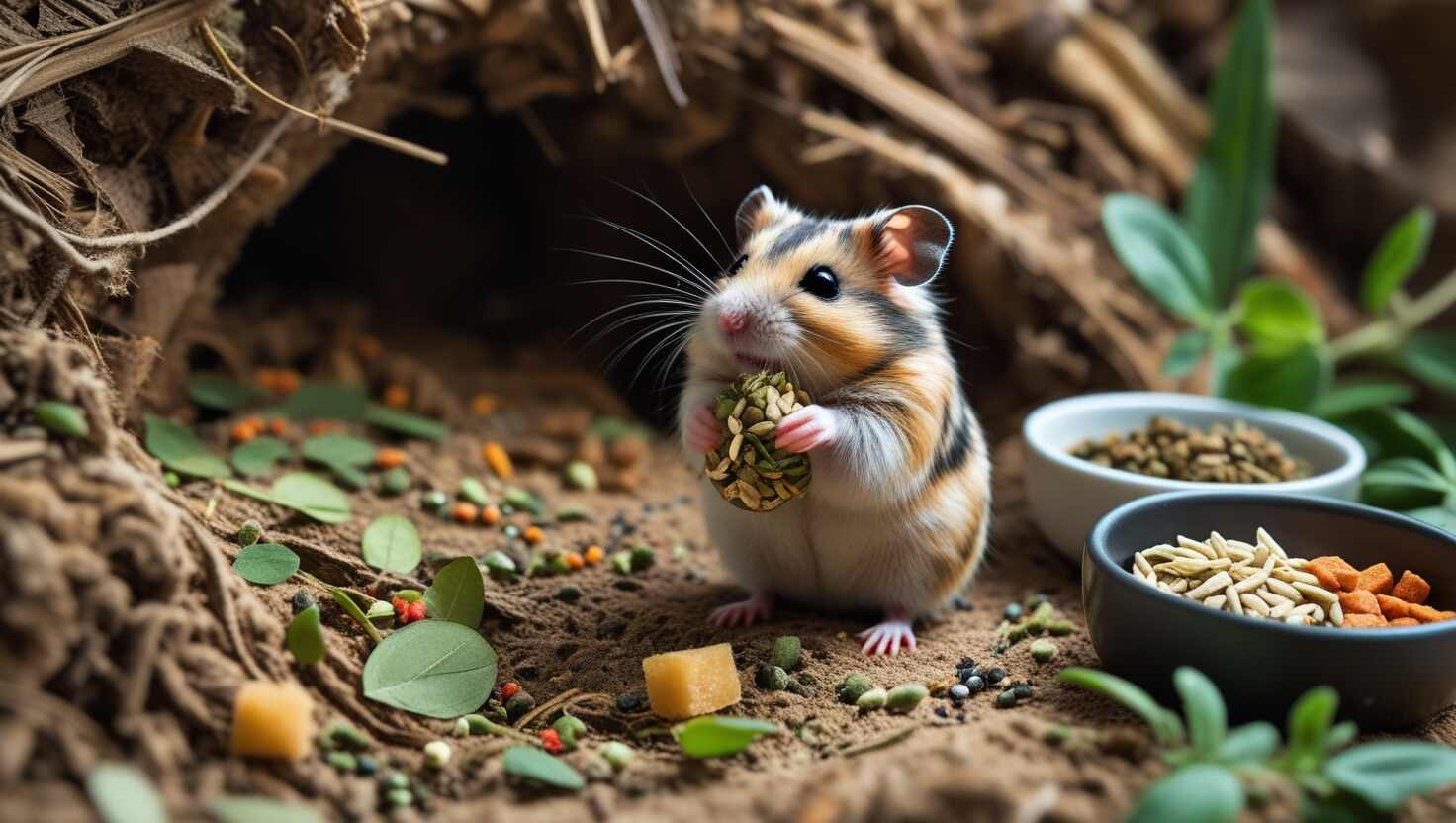What Can Hamsters Eat?
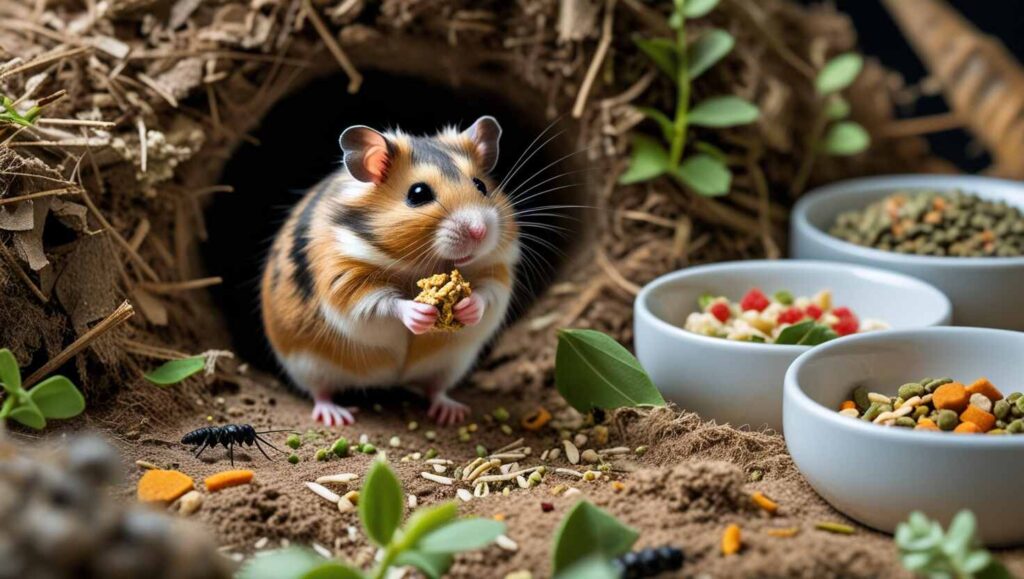
Hamsters are omnivores that need a balanced diet of commercial pellets, fresh fruits, vegetables, and occasional treats. Avoid toxic foods like apple seeds, garlic, and citrus to keep them healthy. Monitor their diet, provide clean water, and consult a vet if health issues arise.
General Overview of Hamster Diet
Hamsters are omnivores, meaning they can eat both plant materials and insects. In the wild, they instinctively carry food in their cheek pouches to store in their burrows. Keeping your cute, furry friend healthy starts with choosing the right hamster food. The majority of their diet should come from store-bought, high-quality foods designed specifically for them. These can include pellets or seed mixes that are rich in protein, vitamins, and other essential nutrients. However, adding fresh foods, like small amounts of plant-based items and occasional treats, adds variety and helps meet their nutritional needs.
Feeding is a key factor in bonding with your affectionate pet, as hamsters can become more socialized and handled gently over time. Avoid giving foods for other animals like rats, mice, or cats. You may feel overwhelmed by the food choices at the pet store, but narrowing your options to commercial foods helps simplify decisions. Gradual changes to their diet prevent rapid shifts that can cause stress, diarrhea, or wet tail. With the right care and diet, your pocket pet can live a happy and healthy life!
Daily Dietary Needs and Balanced Nutrition
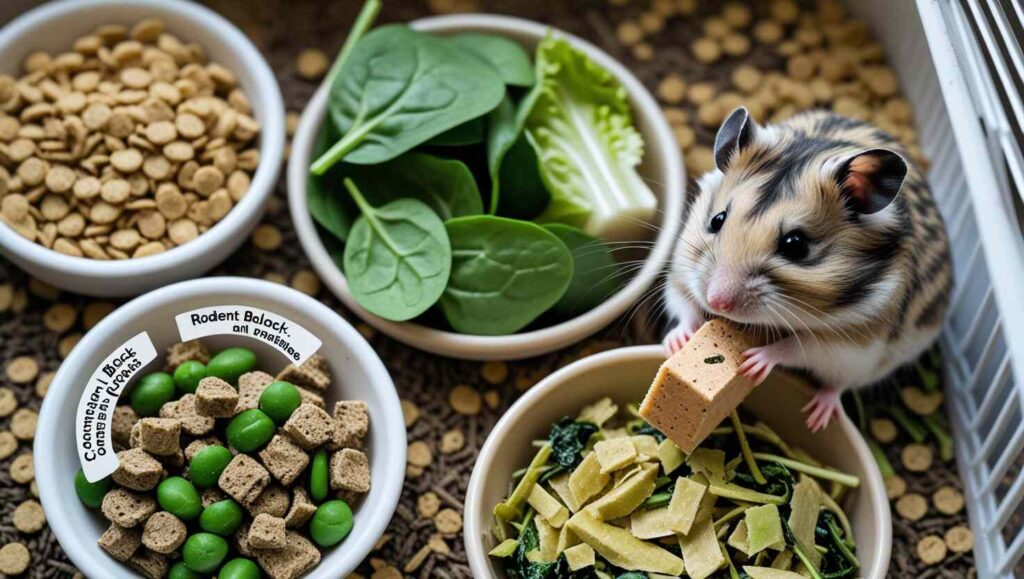
Core Diet and Food Mixture
A well-rounded diet is central to your pet hamster’s health. Use commercial pellets, which are a compound of essential nutrients and calories to prevent deficient nutrition. Supplement with a mixture of fresh vegetables like bite-sized dandelion greens, spinach, and romaine, while avoiding rhubarb, grapes, and iceberg lettuce. These foods can lead to harmful reactions, such as poisoning or digestive problems.
Treats & Chewing Needs
Offer sunflower seeds or non-seasoned nuts in moderation. For dental health, provide chewable items like timothy hay or rodent blocks to help hamsters gnaw and prevent bulging teeth issues.
Food Safety & Cleanliness
Leftover food can rot and attract bacteria, making your hamster susceptible to illness. Clean flat dishes and the cage floor daily to prevent moisture buildup. Avoid powdered or dusty foods, which can affect breathing.
Enrichment & Digestion
Include freeze-dried larvae like crickets for variety. Ensure access to clean water. Offer foods with prebiotics and probiotics to promote healthy digestion. If needed, consult a vet, who may advise on ration adjustments if selective eating becomes an issue.
Types of Foods Hamsters Can Eat
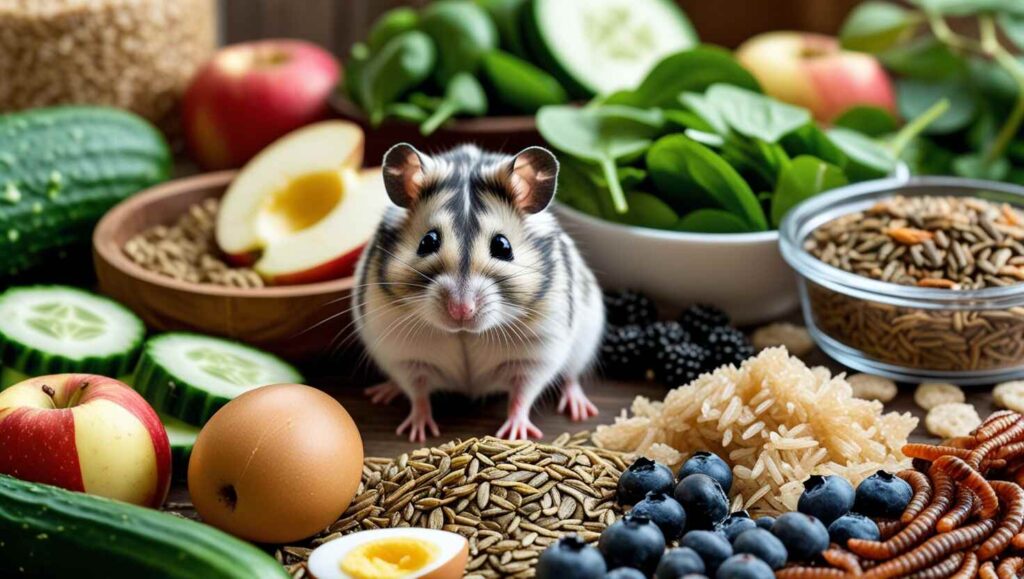
Hamsters love a balanced diet made of pellets, seeds, and fresh foods. A rough guideline is to provide 75% pellets, 20% seeds, and 5% treats to keep your small pet healthy. Always wash produce to remove pesticides and prevent bacteria growth. Remove uneaten food to prevent it from going bad in the cage.
Fresh Vegetables and Fruits
Hamsters can safely eat fresh greens like kale, spinach, romaine lettuce, Swiss chard, and dandelion greens. My hamster’s definite favorite is cucumber. You can also offer carrot tops, broccoli spears, artichokes, and squash in small amounts. Avoid iceberg lettuce, as its water content is too high with little nutritional value. For fruits, they enjoy apples, pears, berries, and melons. Limit sweet fruits to prevent overweight issues and avoid citrus.
Whole Grains and Carbohydrates
To liven their diet and stave off boredom, you can add whole-grain items such as cereals, toast, and unsweetened brown rice. Avoid items with added sugar like cookies and sugary cereal, as these are not good for rodents. Light snacking with popcorn or prepared whole grains helps provide needed carbohydrates and energy.
Protein Needs
Hamsters benefit from occasional non-plant-based protein sources. Options include scrambled or hard-boiled eggs, dried mealworms, plain chicken, and crickets. Ensure these are served without spices or oils. A protein deficit can make your pet thin and weak.
Nuts and Nut Products
Offer unsalted nuts like peanuts, cashews, walnuts, and almonds in moderation. Avoid sticky foods like peanut butter, as they can get stuck in cheek pouches, leading to severe issues.
Additional Care
Give organically grown foods whenever possible. Filtered, chlorine-free water is essential and should be accessible at all times. Lab blocks or seed blends with essential vitamins and minerals can help maintain a well-rounded diet. Always read the package ingredients to ensure it’s designed for hamsters, not gerbils, birds, or other animals.
Special Diets for Hamster Types
Certain dwarf hamsters like Chinese, Djungarian, and Roborovski breeds may be more prone to high-fat diets, so portion control is important. Larger types, like the golden or Syrian hamster, may require more food to maintain their energy needs within their habitat. Regular diet changes and proper preparation help prevent choking and health issues.
Foods to Avoid
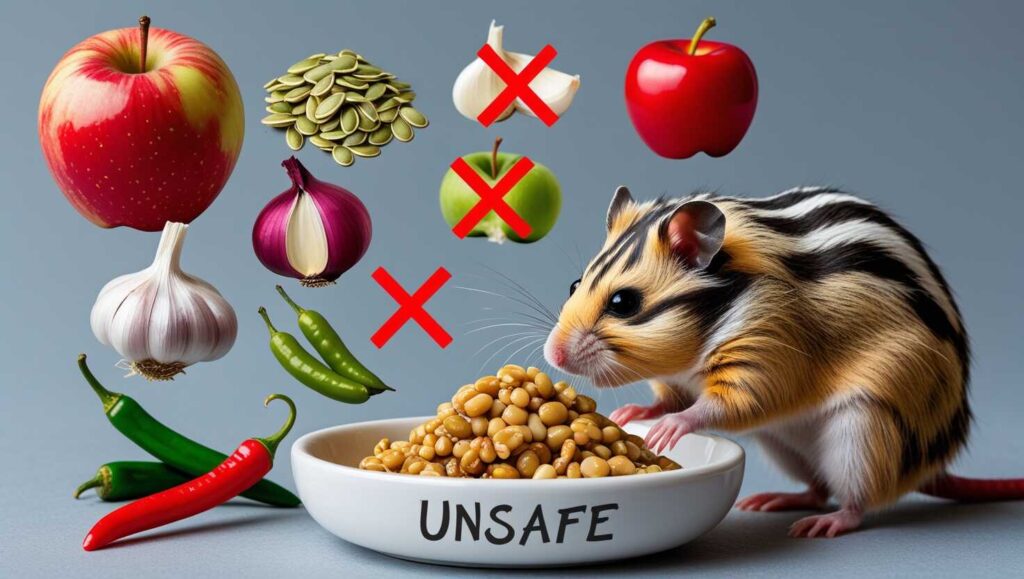
Toxic and Harmful Foods
Although hamsters are omnivores, they should never consume certain foods that can be harmful. Avoid apple seeds, rhubarb leaves, raw beans, and uncooked potatoes as they are toxic. Garlic, onions, and almonds can also injure your pet. Foods like chocolate and junk food with sugar, salt, and fat are dangerous and should not be included in their diet.
Foods That Cause Digestive Issues
Avoid spicy peppers, citrus, and foods with high water content like cucumber, which may lead to overhydration or diarrhea. Feeding human food can also trigger gastrointestinal distress in your hamster.
Protein and Threat Management
Freeze-dried mealworms, optional sources of protein, should only be fed in small pieces. While sunflower seeds and dried fruits may seem appealing, overfeeding them can result in obesity and malnutrition. Use these as treats in moderation to keep your pet healthy.
Expert Advice and Safety Tips
To prevent any accidents, check your hamster’s food for trace amounts of mold. Never give caffeine, alcohol, or foods with excess moisture. Seek advice from a veterinarian or knowledgeable staff at your local Petco for more tips on safe feeding practices.
Treats and Snacks
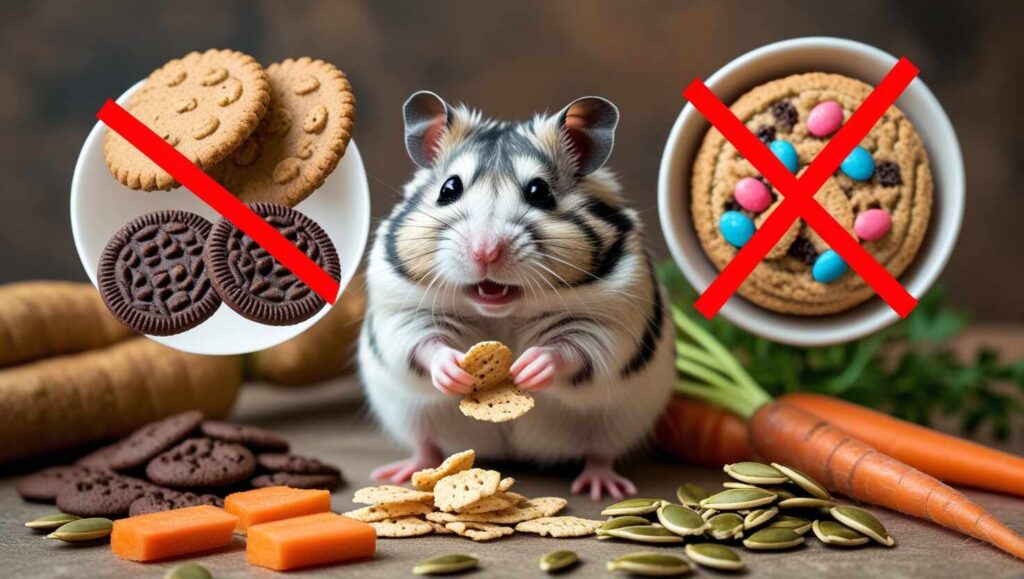
Hamsters are omnivores and benefit from a variety of plant-based and animal-based foods. While their main diet should consist of high-quality commercial pellets with essential vitamins, minerals, and nutrients, treats should only make up about 10 percent of their daily intake. You can offer small portions of fruits like apples, blueberries, and bananas or vegetables such as romaine lettuce, spinach, and carrots.
Avoid giving human foods with sugar. Suitable tasty snacks include sugarless breakfast cereals, cooked pasta, or pumpkin seeds. Introduce these foods gradually to avoid stress, diarrhea, or wet tail. Always offer safe options in moderation to keep your pet healthy.
Special Dietary Considerations
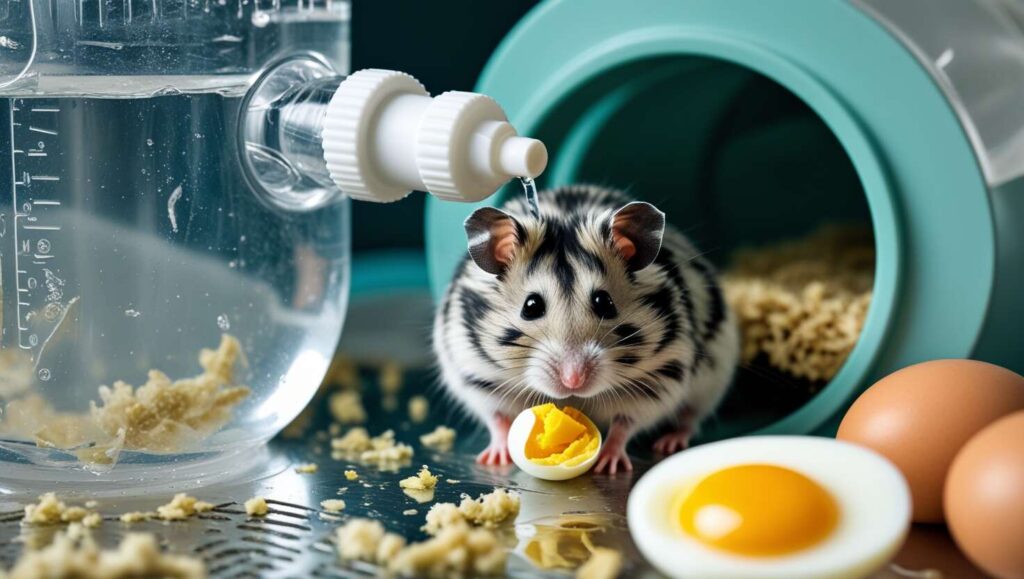
Hamsters are omnivores, requiring both animal-based protein and plant foods. You can provide high-protein options like cooked chicken, hard-boiled eggs, or mealworms in moderation as treats. Their base diet should include pellets for balanced nutrition. Regular cleaning of the cage is crucial to prevent mould, bacteria, and traces of food that can rot and make them sick.
Ensure fresh, clean drinking water is always available using a bottle with a valveless sipper tube to avoid leaks or blockages. A vet may be advised for hamsters with dental problems or other difficult conditions. Check the nozzle regularly for any mechanical obstruction or pinch in the segment to ensure proper water flow. This is especially important for young, old, or sick hamsters.
Importance of Monitoring Diet
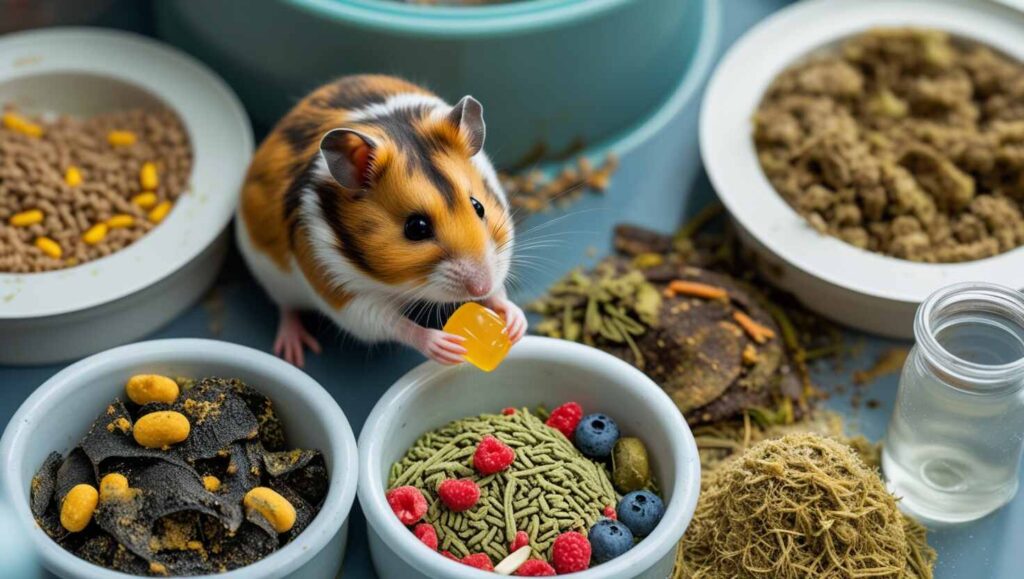
For hamsters, proper husbandry and nutrition are vital to avoid common problems like obesity, malnutrition, and diseases such as diabetes. Always feed them a high-quality diet with the right amount of vitamins and minerals to keep their body functioning well.
Monitor what your family pet eats and drinks daily. Look for signs of illness, like stale food, moist hind-quarters, or soiled droppings, and contact a vet immediately if you notice these. Avoid sudden dietary changes to prevent stomach issues.
Frequently Asked Questions (FAQ)
Which human foods are safe for hamsters to eat?
Hamsters can safely eat small amounts of fresh, clean fruits and vegetables such as carrots, apples (without seeds), celery (without strings), and cucumbers. Avoid processed foods, sugary items, or anything with harmful ingredients.
Which foods are toxic to hamsters?
Toxic foods include almonds, apple seeds, fruit pits (like from cherries), tomato leaves, spicy peppers, and citrus fruits. These can have a toxic effect on hamsters and cause serious health issues.
How long can a hamster go without food?
Hamsters can survive three to four days without food, but this is not recommended. Always ensure they have access to fresh food and water.
How much does hamster food cost?
Hamster food typically costs around a few dollars for a small bag of commercial pellets or seed mixes. Prices may vary depending on brand and quality.
How much food should I feed a hamster?
You should feed about 1/8-cup of food daily. Follow the manufacturer guidelines and provide a balanced mix of grains, nuts, and protein. Remove uneaten food regularly to keep the cage clean.
Kindly note: The content shared in this blog is gathered from online sources, some of which may not be verified. For accurate guidance on caring for your hamsters, it is recommended to seek advice from a qualified veterinarian.
